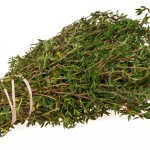Thyme – A Substitute for Coffee and Much More
Thyme is known to have valuable properties since ancient Egypt, Greece and Rome, where it was used for embalming, as an incense in temples, and for flavoring cheese or alcoholic beverages, respectively. In present time, some of its medicinal properties have been demonstrated by scientific studies and many others are confirmed by everyday domestic use. One of the most significant is the overall energizing effect on the organism, which is due mostly to the fact that its main constituent, a volatile oil, can act pretty quick and simultaneously on the nervous, respiratory and digestive systems.

Thyme was considered since ancient times a symbol of courage (the name having its origin in the Greek word thymus, which means precisely that), being ritually given by women to their knights as late as the middle ages for strengthening the will and the mind. Echoes of this custom are now present in the appreciation of its strong anti-infectious, antidepressant and energizing properties. So, if you’re looking for a coffee substitute, don’t hesitate to give thyme a try. Take courage from a morning cup of thyme tea and see to the issues of the day with strengthened resolve and joy.
Contents
Uses confirmed by certain studies
- Acne (a study conducted at Leeds Metropolitan University demonstrated the radical anti-infectious effect against Propionibacterium acne)
- The Tiger mosquito (researchers from Chungbuk National University in South Korea found that, in combination with other two substances, thymol – the main active component of thyme essential oil – was powerful enough to kill the larvae of this mosquito, which is responsible for the transmission of West Nile virus, yellow fever virus, St. Louis encephalitis, dengue fever and Chikungunya fever)
- High blood pressure (a study conducted, so far only on rats, at University of Belgrade in Serbia)
- Foodborne infections (a Portuguese and a Polish study)
- Colon cancer (a study conducted at Universidade Nova de Lisboa in Portugal)
- Breast cancer (a study conducted at Celal Bayar University in Turkey)
- Yeast infections (a study conducted at University of Turin in Italy)
- Eczema-like lesions (a study conducted at Addis Ababa University in Ethiopia)
Other uses
- Anger, bitterness, resentment, lack of concentration
- Asthma, bronchitis, pleurisy, emphysema
- Colds, flu, pneumonia, tuberculosis
- Rhinitis, sinusitis
- Snoring
- Bites, stings, boils, ulcers, bruises, burns
- Blood clots
- Greasy and fragile hair
- Psoriasis
- Dental pain, sciatica, rheumatic pain
- Cystitis, urethritis, pyelonephritis
- Anorexia, chronic gastritis, biliary dyskinesia, gastrointestinal spasms, colitis, intestinal parasites
How to prepare it
- Infusion (for internal use): add 1 teaspoon of dried plant to a cup of hot boiled water and let steep for 10 minutes. Drink 3 cups a day, before or after a meal.
- Decoction (for external use): add 50 g of dried plant to 1 l of water and boil for 3 minutes. Use as lotion, compress, mouthwash, instillation etc.



